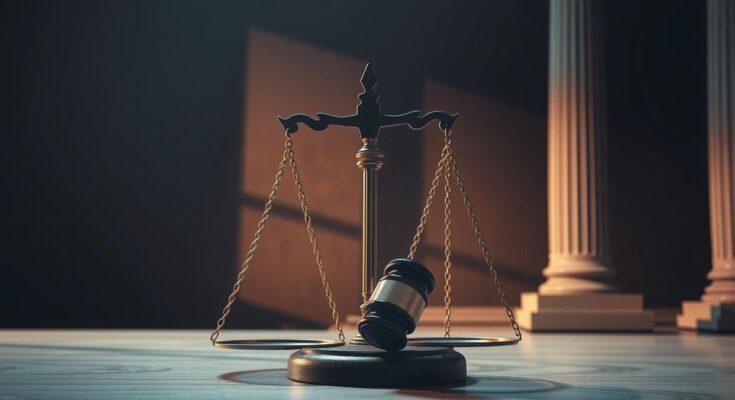A mass trial against roughly 40 opposition figures began in Tunisia, facing charges of plotting against state security. Human rights advocates and the UN have condemned the trial as politically motivated and unjust. Accused individuals include politicians, lawyers, and critics of President Kaïs Saïed, with some having fled the country. Demonstrations reflect public outrage against perceived judicial abuses and authoritarian control.
A mass trial involving approximately 40 notable opposition figures commenced in Tunisia, with assertions from attorneys, relatives, and human rights organizations indicating that the proceedings are politically motivated. Defendants include diplomats, politicians, lawyers, and journalists who have been critical of President Kaïs Saïed, and they face severe charges such as “plotting against state security” and “belonging to a terrorist group,” which could result in the death penalty.
Human Rights Watch has criticized the trial as a “mockery” stemming from “abusive charges,” while the United Nations has recently called upon Tunisian authorities to cease all forms of persecution against political adversaries. The Tunisian foreign ministry expressed disbelief regarding the UN’s assertions, contending that Tunisia can offer lessons to those they believe are wrongly commenting on its affairs.
This trial symbolizes President Saïed’s authoritarian grip on the judiciary, particularly following his dissolution of parliament in 2021 and subsequent rule by decree. Since his election six years prior, he has modified the constitution to concentrate power in his hands. During the trial, defenders claimed that they were denied access to the complete case file, prompting lawyer Abdelaziz Essid to implore the judges to “put an end to this madness and absurdity.”
Notable figures among the accused include Nadia Akacha, the former presidential chief of staff, Abdelhamid Jelassi, former leader of the Ennahda opposition party, and Jaouhar Ben Mbarek, a prominent critic of Saïed’s power extension. Some defendants, including Akacha, are being tried in absentia due to their departure from the country. Many accused individuals have remained in custody since their arrest two years ago, with President Saïed designating them as “terrorists.”
Bassam Trifi, the head of the Tunisian League for the Defense of Human Rights, characterized the events as “one of the darkest injustices in Tunisia’s history.” In response, demonstrators have gathered outside the courthouse in Tunis, displaying banners with calls for “No to remote trials” and “freedom for political detainees.” Their protest underscores the growing dissatisfaction with the current judicial processes in Tunisia.
The commencement of the mass trial in Tunisia, involving numerous political opponents of President Saïed, raises significant concerns about the fairness and impartiality of the judicial system under his regime. The serious charges faced by defendants, criticism from human rights organizations, and public demonstrations point to a broader struggle for political freedom and justice in the country. This situation reflects a troubling trend of escalating authoritarianism following constitutional alterations and the dissolution of parliament.
Original Source: www.bbc.com




